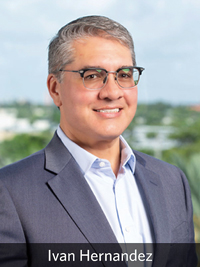Editor's Note: This article is part of the Financial Advisor series "How I Solved It." Advisors describe a client with a problem and what they did to help.
Estate planning is essential to every wealthy family. The goal of a good estate plan, in part, is to transfer the wealth and business of a family to heirs with as little taxation as possible.
 Ivan Hernandez, managing director of Omnia Family Wealth in Aventura, Fla., was faced with a client couple whose estate planning was in neglect and falling short of their goals when he entered their lives. He worked to correct the issues and revise as much of the plan as possible to avoid a big tax bite after reporting lapses occurred due to staffing changes in the family’s business.
Ivan Hernandez, managing director of Omnia Family Wealth in Aventura, Fla., was faced with a client couple whose estate planning was in neglect and falling short of their goals when he entered their lives. He worked to correct the issues and revise as much of the plan as possible to avoid a big tax bite after reporting lapses occurred due to staffing changes in the family’s business.
Hernandez started out in the financial industry in the mid-1990s at a fixed-income shop, but soon transitioned to a more holistic approach to financial planning. He co-founded Omnia Family Wealth in 2015 with the idea that he wanted to look at clients' whole financial picture and life goals, not just the investments and returns.
Omnia serves high-net-worth families, most with between $20 million to $75 million in assets. These folks have “complex financial situations with a lot of land mines that require experience to navigate and long-term continuity for the heirs,” Hernandez said. “These families need specific types of planning that are coordinated with the overall family dynamics.”
In the case of the family that needed strategic estate planning, a husband and wife owned a family business on the West Coast with hundreds of employees and a valuation of about $150 million. When Hernandez first came on the scene the couple was in their 60s and had plans for their two adult children to ultimately take over the family business. At that point the couple started a small relationship with Omnia Family Wealth and had a much larger relationship with a separate trust company. Eventually, all of the family holdings were transferred to Omnia to help coordinate the family’s vision.
“As I always do, I asked for their tax filings and estate planning documents, even though they said their estate plans were set," Hernandez explained. "When I do this, I often find some requirements that are not being complied with, or some things that could be done in a more advantageous way for the client. The estate planning documents show me what the family has done. Only deep conversations and understanding will reveal what the family is truly trying to accomplish and what may be possible.”
The couple had sold part of the business to their two adult children years before the family’s engagement with Omnia. It was set it up so the children would pay their parents for the shares of the company out of the dividends they received. But a problem arose after the retirement of the person within the company who had helped maintain the trust agreement, and the children unknowingly did not make payments for over a year.








